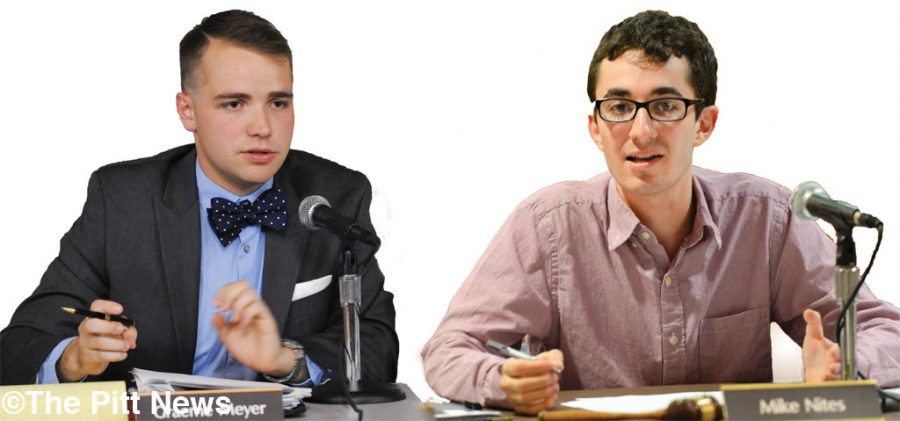End of the road: Board reflects on initiatives
December 7, 2014
While the majority of the Board spent their terms trying to pass campaign initiatives, almost half the members passed in their resignation letters.
During the SGB term, which began Jan. 6, 2014, and ends Jan. 5, 2015, four of the nine Board members resigned. With only five of the original elected members left, the Board members spent a portion of their terms — including more than 20 hours of interviews, according to Board member Andrew Abboud — appointing replacements.
Mike Nites
Student Government Board President Mike Nites said the resignations delayed his campaign initiatives but didn’t keep him from completing them.
“With every person we lost, we became stronger,” Nites said. “We had to work together, and we have a great team now.”
Nites’ campaign initiatives included creating a student advisory council, revising the Allocations Manual and increasing collaboration between Board members and transparency with the student body.
The Board introduced the advisory council, called the student assembly, at public meeting on Nov. 5 and passed a resolution to put the assembly up to a student vote. The student body voted on and passed a referendum on SGB election day, Nov. 11.
Nites said he wanted to introduce the student assembly last spring, but had to delay the project after three Board members resigned in the first three months of the term.
Nites said it’s “hard to measure” the ways he’s worked in the past year to make SGB more transparent.
The Board voted to publicly approve their own budgets at the Board’s weekly public meeting on Jan. 7. The Board also voted to make all student group budget requests public at itspublic meeting on March 25.
Nites said some other changes included meeting with students about student government bills and resolutions before voting, which did “a lot to gather more student input.” Some of those meetings, Nites said, included four he held in September, October and November with club sports leaders about Bill 0025, which will limit club sports allocations. The Board passed the bill on Dec. 3.
Andrew Abboud
Andrew Abboud’s campaign platforms included lowering book prices at the University Bookstore, increasing fitness facility hours and increasing study space on campus.
After he met with officials from the University Store on Fifth , Abboud said, he discovered that lowering the costs of textbooks would not be feasible during his term.
It will require more academic departments’ involvement and discussions with Pitt administrators, he said, which will be easier now that the SGB term is aligned with the academic calendar. The student body passed the term change on Oct. 10.
Abboud said he instead focused on enhancing communication between the bookstore and the student body. He said Robert Sica, previous academic affairs committee chair, nominated another member last March, Nayanika Basu, as the bookstore liaison. Abboud said he originally intended to create a group of student liaisons, but decided one person would be enough.
In the last few months of his term, Abboud announced that fitness facilities, including the Baierl Recreation Center and space on the third floor of the William Pitt Union, would be open for 16 more hours weekly as of Oct. 16.
Abboud said he spoke with members from the Facilities Management Department about repurposing campus space, adding that he thinks the need for more study space is on Pitt administrators’ “radar.”
Abby Zurschmit
Zurschmit joined the Board with ideas for riding safe and eating well. Zurschmit, who previously served as the safety and transportation committee chair, said she wanted to create a SafeRider app and increase student usage of the William Pitt Union, specifically by extending dining hours.
Zurschmit said she discussed ideas for the app,before she joined the Board and in the first few months after she joined the Board, with Kevin Sheehy, director of the Parking, Transportation and Services department, and they found it overlapped with the University’s work on an app, the current status of which Zurschmit said she doesn’t know.
Zurschmit shifted her focus to bringing more students to the William Pitt Union by extending the Schenley Cafe’s dining hours. She announced on Oct. 8 that the Pizza Hut and Taco Bell would be open for an additional nine hours on the weekends.
“I wanted to extend the dining hours so more students felt that was a place they could go to eat and study on the weekends,” Zurschmit said.
Graeme Meyer
Board member Graeme Meyer said he “ran on some large initiatives.”
“I knew I would be on campus for many years to come, so I planned to utilize this time to attack some larger initiatives,” Meyer said in an email.
Meyer completed his initiative for the Crisis Relief Fund to fund students who encounter an unexpected emergency, like a house fire, providing them with “essentials” to “get back on their feet,” he said.
“Although I hope no one has to use it, I think it is a great resource to have available for our students,” Meyer said.
Other initiatives Meyer said he will continue to work on as the Board’s president next term include looking into the University’s tobacco usage policy and “improving access” to resources, including adding preventative measures for assault victims both on and off campus.
For the tobacco policy, Meyer said he contacted organizations like Pitt’s Student Health Service and the Allegheny County Health Department and conducted a survey regarding student opinion of smoking on campus.. Meyer said he “hope[s]” to introduce a formal proposal next semester.
For assault victims, Meyer said he looked into expanding the blue light system, but, after conversations with Officer Johnson of the Pitt police, he realized that wasn’t feasible. Instead, Meyer said he has been working to introduce a blue light safety app through a third party vendor. Meyer said he will show a demo for the blue light safety app during the second week of next semester.
Nick Hufnagel
Hufnagel joined the Board on March 18 to replace Jake Radziwon, who resigned on Feb. 27.
Hufnagel said his initiatives included opening up office and storage space in the O’Hara Student Center and storage space in the William Pitt Union for SORC-recognized student organizations, and bringing a TEDx talk to Pitt.
The process of getting space is “ideally easier,” Hufnagel said, with an online application available on SGB’s website on Oct. 22.
Additionally, Hufnagel said he’s been working on what he called the “TEDx project,” which aims to host a TEDxtalk on Pitt’s campus.
In order to host a TEDx talk, Hufnagel needs to obtain a license from the non-profit organization TED. Hufnagel said he turned in a third application for a license, because TED denied his first two proposals. Hufnagel said TED denied his first proposal because of an issue with the wording and denied the second proposal becaue TED needed a more complete list of speakers.
Hufnagel said he will continue to work on this project after his term ends with another collaborator and incoming Board member Jacky Chen.
Sara Klein
Sara Klein’s initiatives included increasing gym hours and increasing campus safety.
Safety Week, according to Klein, was a week-long event facilitated by SGB and the Pitt police, as well as the Oakland Transportation Management Association, PennDOT and the PA DUI Association.
“In the long run, I hope the safety week initiatives will really take off,” Klein said, adding that she’d like the event to occur annually.
Other initiatives Klein ran on included extending gym hours, which she said she worked on with Board member Abboud, as well as “a student voice initiative.”
She said she emailed the student groups for which she’s a liaison and met with the ones who responded. As a result, Klein said she was able to provide aid to the groups “with issues that they needed help with” as well as with their larger projects, some of which are ongoing. Klein declined to identify the groups or their projects because she doesn’t know if the groups want their project ideas made public.
“The main thing I wanted to do was make sure that we represented the students,” Klein said.
Mona Kazour
Mona Kazour’s initiatives included promoting cultural awareness and establishing a relationship between Pitt students and Oakland residents.
Kazour said she has made progress this semester on a Service Learning Certificate,a program which merges classwork with volunteer work, which she said will be housed in the School of Social Work with financial backing from the University Honors College.
Kazour said she created a list of 15-16 courses so far that could count toward the certificate, including Seminar in Composition: Service Learning and a geology class titled “Sustainability.” Additionally, Kazour said the certificate is projected to require 160 hours of community service and an independent project. Kazour said she has yet to officially determine the independent project’s requirements.
Kazour said she will continue working on the certificate next semester.
She said she has also worked with the Allocations Committee to make the process “more digestible for students” and sat in on meetings with Nites and club sports teams about the allocations cap.
“There’s always work to be done with allocations,” Kazour said.
Kazour did not make much progress on hisinitiative to increase cultural awareness.
Kazour said she was in contact with Tia Key, the international programming coordinator and adviser from Pitt’s Office of Cross-Cultural and Leadership Development, but that the initiative “wasn’t on the forefront.”
Ben West
Ben West joined the Board on April 6, filling one of the two vacancies left by former Board members Ellie Tsatsos and Brandon Benjamin, who both resigned on March 25.
West’s initiatives during his second interview with the Board included creating an online calendar of on-campus and off-campus events and improving the transition for students from living on-campus to living off-campus.
West said he spoke with Kannu Sahni, director of community relations, and John Wilds, assistant vice chancellor for community relations, over the summer and during this semester, to discuss the resources Pitt has available for off-campus students, many of which he “didn’t realize.”
West decided to shift his focus to publications racks, a project the Board started discussing at a weekly public meeting in February.
“I didn’t want the publication racks to fall through the cracks,” West said.
The Board approved a bill on Oct. 28 to purchase seven publication racks for $1,486.70, to put in on-campus buildings.
West said he expects the racks to be available for student publications next semester.
Meghan Murphy
Murphy joined the Board hoping to help other members complete their initiatives.
Murphy was the fourth and final member to join the Board in August, replacing Ryan Orr, who resigned on July 1.
Murphy said after the Board members selected her from a pool of six finalists, she wanted to assist Abboud and Klein with their wellness initiatives and Zurschmit with increasing campus dining hours.
To promote the extended gym and dining hours, Murphy said she distributed flyers and emailed student groups after the Board announced the change.
After Murphy joined the Board, she decided to make it her initiative to inform students about SGB events and updates on changes.
“My main focus was to increase campus-wide knowledge of what SGB is doing,” Murphy said.
She worked with UPTV to film and broadcast weekly SGB updates and filmed a video on how the allocations process works for student groups, which will be available next semester. Murphy also created a template for an SGB newsletter that the incoming Board will use to update the student body in a similar way the UPTV videos functioned this semester.



